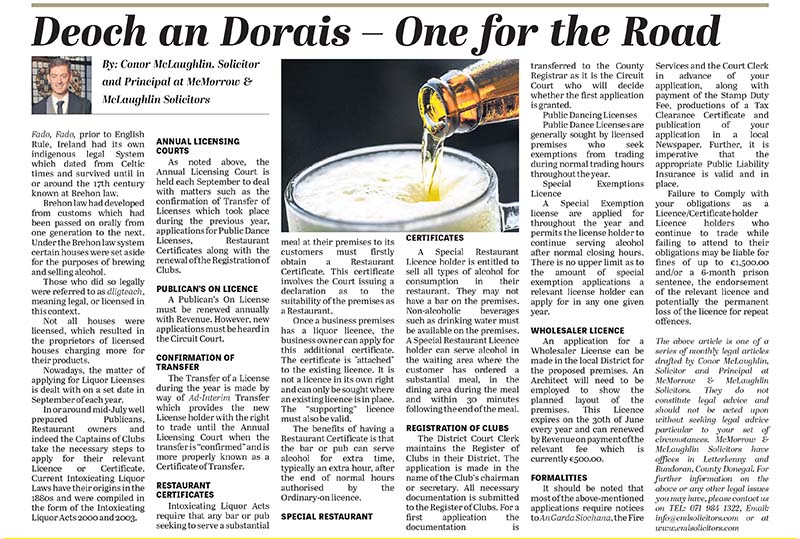
Deoch an Dorais – One for the Road
Fado, Fado, prior to English Rule, Ireland had its own indigenous legal System which dated from Celtic times and survived until in or around the 17th century known at Brehon law.
Brehon law had developed from customs which had been passed on orally from one generation to the next. Under the Brehon law system certain houses were set aside for the purposes of brewing and selling alcohol. Those who did so legally were referred to as dligteach, meaning legal, or licensed in this context. Not all houses were licensed, which resulted in the proprietors of licensed houses charging more for their products.
Nowadays, the matter of applying for Liquor Licenses is dealt with on a set date in September of each year. In or around mid-July well prepared Publicans, Restaurant owners and indeed the Captains of Clubs take the necessary steps to apply for their relevant Licence or Certificate. Current Intoxicating Liquor Laws have their origins in the 1880s and were compiled in the form of the Intoxicating Liquor Acts 2000 and 2003.
Annual Licensing Courts
As noted above, the Annual Licensing Court is held each September to deal with matters such as the confirmation of Transfer of Licenses which took place during the previous year, applications for Public Dance Licenses, Restaurant Certificates along with the renewal of the Registration of Clubs.
Publican’s On Licence
A Publican’s On License must be renewed annually with Revenue. However, new applications must be heard in the Circuit Court.
Confirmation of Transfer
The Transfer of a License during the year is made by way of Ad-Interim Transfer which provides the new License holder with the right to trade until the Annual Licensing Court when the transfer is “confirmed” and is more properly known as a Certificate of Transfer.
Restaurant Certificates
Intoxicating Liquor Acts require that any bar or pub seeking to serve a substantial meal at their premises to its customers must firstly obtain a Restaurant Certificate. This certificate involves the Court issuing a declaration as to the suitability of the premises as a Restaurant.
Once a business premises has a liquor licence, the business owner can apply for this additional certificate. The certificate is “attached” to the existing licence. It is not a licence in its own right and can only be sought where an existing licence is in place. The “supporting” licence must also be valid.
The benefits of having a Restaurant Certificate is that the bar or pub can serve alcohol for extra time, typically an extra hour, after the end of normal hours authorised by the Ordinary-on licence.
Special Restaurant Certificates
A Special Restaurant Licence holder is entitled to sell all types of alcohol for consumption in their restaurant. They may not have a bar on the premises. Non-alcoholic beverages such as drinking water must be available on the premises. A Special Restaurant Licence holder can serve alcohol in the waiting area where the customer has ordered a substantial meal, in the dining area during the meal and within 30 minutes following the end of the meal.
Registration of Clubs
The District Court Clerk maintains the Register of Clubs in their District. The application is made in the name of the Club’s chairman or secretary. All necessary documentation is submitted to the Register of Clubs. For a first application the documentation is transferred to the County Registrar as it is the Circuit Court who will decide whether the first application is granted.
Public Dancing Licenses
Public Dance Licenses are generally sought by licensed premises who seek exemptions from trading during normal trading hours throughout the year.
Special Exemptions Licence
A Special Exemption license are applied for throughout the year and permits the license holder to continue serving alcohol after normal closing hours. There is no upper limit as to the amount of special exemption applications a relevant license holder can apply for in any one given year.
Wholesaler Licence
An application for a Wholesaler License can be made in the local District for the proposed premises. An Architect will need to be employed to show the planned layout of the premises. This Licence expires on the 30th of June every year and can renewed by Revenue on payment of the relevant fee which is currently €500.00.
Formalities
It should be noted that most of the above-mentioned applications require notices to An Garda Siochana, the Fire Services and the Court Clerk in advance of your application, along with payment of the Stamp Duty Fee, productions of a Tax Clearance Certificate and publication of your application in a local Newspaper. Further, it is imperative that the appropriate Public Liability Insurance is valid and in place.
Failure to Comply with your obligations as a Licence/Certificate holder
Licence holders who continue to trade while failing to attend to their obligations may be liable for fines of up to €1,500.00 and/or a 6-month prison sentence, the endorsement of the relevant licence and potentially the permanent loss of the licence for repeat offences.
